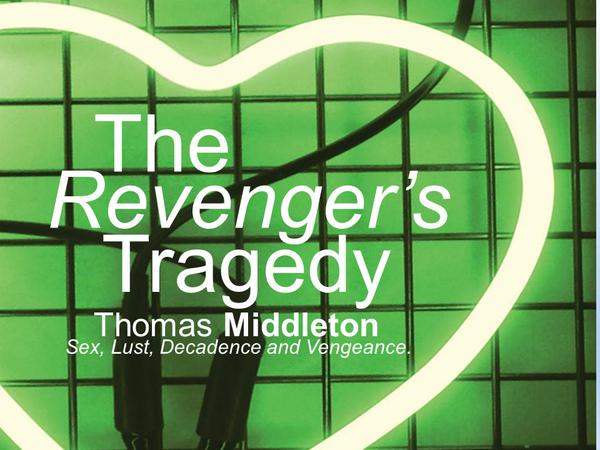
March 23, 2015, by Peter Kirwan
The Revenger’s Tragedy (Lazarus Theatre Company) @ The Brockley Jack Studio Theatre
At ninety minutes long, Lazarus Theatre’s take on Middleton’s seminal revenge tragedy still felt leaden and ponderous, a dull take on a sparkling play. While the production was full of ideas and some striking performances, the eclectic cutting and rigid spatial organisation rendered the play frequently unintelligible and confusingly abrupt, obfuscating rather than clarifying the action.
The most obvious example of this was the play’s opening. While Middleton begins The Revenger’s Tragedy with a direct visual quotation from Hamlet, as a man holds up a skull, here the production clumsily attempted to introduce key characters (but only selected some of the brothers, for some bizarre reason privileging Spurio over the more involved Ambitioso and Supervacuo) and play out the rape of Antonio’s wife and murder of Gloriana through uncomfortable physical sequences where masked figures pushed two of the female actors around in a circle, before Lewis Davidson’s Vindice finally picked up Gloriana’s discarded mask. Ignoring the fact that a mask, however well introduced, simply does not carry the necessary resonance of a skull, the production made no attempt to clarify the relationships being evoked in this sequence, muddying the waters from the start.
As the production went on, the fragmentary approach to cutting continued to unbalance the play. Certain sequences, particularly Vindice’s bribing of Gratiana, were played out at great length, allowing the actors to build a relationship across a sustained period of action. Other elements were slashed to incoherence, particularly Vindice’s relationship with Lussurioso, which was established wonderfully (Vincide, within seconds of meeting the prince, going down on his knees and opening his new master’s flies) but barely revisited. Most disappointingly, at the ninety-minute mark the play seemed to have an enormous crisis of confidence in a rush to bring in the play at a certain length, and compressed the final scenes into barely a minute of action, with a few handclaps dispatching six bodies instantaneously and Antonio’s condemnation following instantly. All satire, pathos, intelligibility and wit were abandoned in what seemed to be a complete unwillingness to engage with the play, and the rushed ending left me questioning why the company had bothered to put on the play at all if it didn’t even want to finish it.
The other key frustration was a rudimentary spatial division that saw the action happening in a circle while masked figures stood on the outside looking in. Director Gavin Harrington-Odedra seemed torn between performing to the thrust space of the Jack Studio and a set that seemed designed for an in-the-round layout, and the surrounding bodies too often obscured the action. As actors left the circle they made a sudden shift to slow motion, moving tentatively and silently as they stooped to pick up their masks, or to remove them again before re-entering the circle. Yet this became fatally distracting, as during any scene there would be people moving around the outside, either warming up or cooling down from their scene, leaving the overall visual impression scrappy and confused. Why bother with the masks at all (particularly when the final masque was being cut anyway)? The generic sense of anonymous watchers may have tried to evoke a world of surveillance, but with the play cut so drastically, any such impression could be nothing more than superficial.
The cast were generally better than the production, with Davidson’s Vindice a standout in particular. The play’s spatial layout made most sense when Vindice was stood alone in a spotlight, railing against the world, while the anonymous watchers looked on. His charismatic performance was under-served by the cutting, removing much of his wit and hubris, but his fawningly sycophantic disguise, performed with oily voice, was suitably hypocritical, and his sustained pressure on his own mother was punctuated with frustrated asides that gave an efficient account of the character’s conflict. Paula James, meanwhile, was particularly good as Gratiana, lusting after Vindice’s coins and becoming possessed with delight over the idea of her own advancement. I also liked Joe Mott’s Spurio, played here with an eye on the Shakespearean bastards, who mirrored Vindice in his calculated asides and self-possession.
Elsewhere, however, the anonymity of the costume (all suits and dark dresses in a generically ‘Jacobean’ aesthetic) and anaemic approach to spectacle (when not side-stepped altogether, as in the final act) made this a literally dull viewing experience, with little variety and few distinguishing characteristics. Neither Tom Jobson or Liam Steward-George as the Duke and Lussurioso had the opportunity to establish their characters – and in fact, the blocking of the Duke frequently put him upstage obscured by bodies, camoflaging him against the black backdrop and diminishing his presence. The physical sequences, while occasionally visually interesting (reporters demanding Antonio’s response to his wife’s rape, even though this was ripped from the movie), were not built into any sustained exploration, and too frequently simply involved actors marching briskly around and across the stage. It didn’t help, further, that there were so many instances where actors didn’t seem to understand the lines they were saying, and given the severe cutting this only lent to the incoherence (particularly as Lussurioso interrupted his father and the Duchess, where the Duke’s expression of mild annoyance rather worked against lines in which he is pleading expressly for his life).
There were good, incipient ideas here, but Lazarus’s Revenger’s Tragedy felt to me like a workshop treatment of a selection of scenes rather than a fully realised production, and its abrupt ending seemed to suggest that the whole was without meaning or intention. While it’s possible to argue that a kind of emptiness may be appropriate to a play whose self-conscious parody critiques and satirises a genre, here it felt like an absence of investment rather than a choice.
No comments yet, fill out a comment to be the first

Leave a Reply